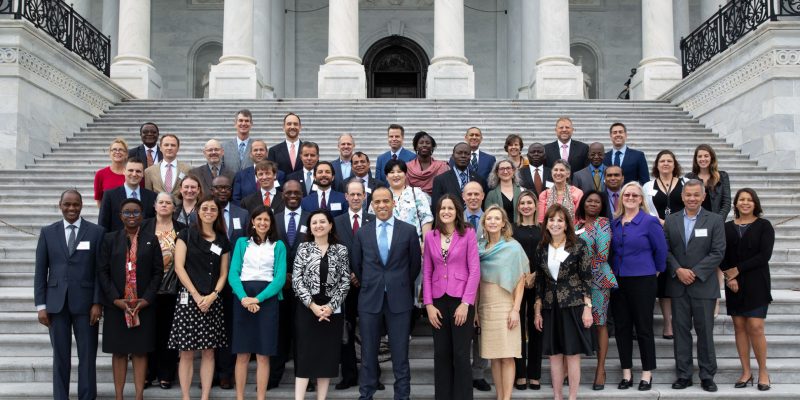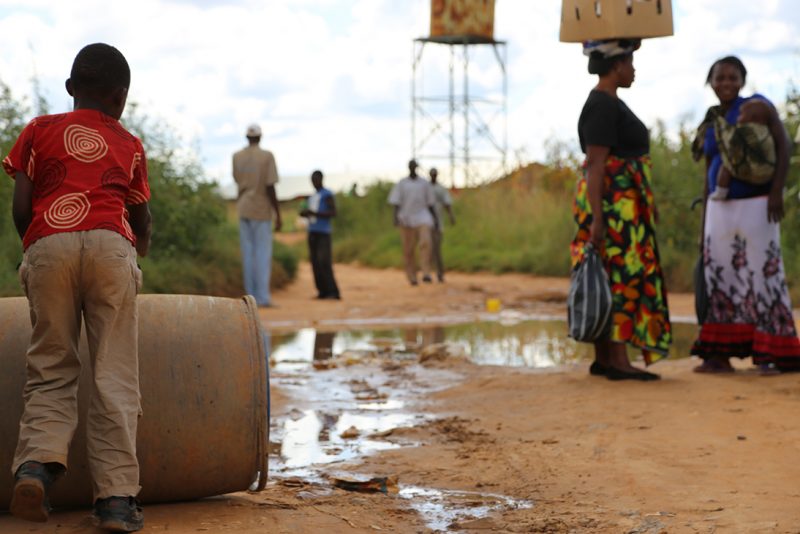
MCC Leadership Conference participants at the U.S. Capitol Building
Following the conference, I had the opportunity to speak with Steve Marma, Resident Country Director for Zambia, and Pamela Bwalya, CEO of MCA-Zambia, to discuss their biggest takeaways from the conference before they head back to Lusaka where they are preparing for the closeout of the five-year MCC Zambia Compact this November.
Why is the Leadership Conference important for your work as the leaders on the ground implementing a compact?
The Leadership Conference brings together MCC’s country leadership and Millennium Challenge Account (MCA) CEOs from all of our programs. It is a unique opportunity to meet our counterparts and colleagues from around the world and to share experiences—and a chance for MCC leadership to hear directly from MCC field staff and MCA and threshold program CEOs about work being done on the ground.
MCC is implementing programs around the world to reduce poverty by focusing on projects in sectors that can unlock the economic growth in a particular country, like infrastructure, education, or water and sanitation. The five-year programs are large and complex, and this conference allows for the exchange of ideas and information sharing that leads to better design and implementation of MCC programs.
What has been your biggest takeaway from the Leadership Conference?
Although MCC works in many different countries and sectors, programs still have much in common. One of the biggest takeaways has been that our colleagues from different programs face similar challenges and solutions are often transferable from country to country.
Steve: For example, as a Resident Country Director (RCD) who has worked on multiple compacts, I have found that the challenges in setting up a new MCA, hiring and managing MCA staff, procuring contractors and consultants, working with implementing entities, and establishing good project management are similar no matter where you are in the world. MCC prides itself on being a strong learning institution, and we look to use that learning to improve our [MCC and MCAs’] experiences. This conference provided an excellent opportunity to identify key challenges and make specific recommendations for continued improvement to MCC and to MCAs.
The closeout of the five-year, $355 million Zambia Compact is coming up this November. Tell us about what you have been working to accomplish through this compact?
The MCC Zambia Compact is working to improve the lives of approximately 1.2 million people by providing access to clean drinking water, improved sanitation and a new lined primary drain that will reduce flooding. Our ultimate focus is on the Zambians who will benefit from MCC’s investment, and to achieve those benefits we spend most of our time implementing nine major infrastructure projects in a complex urban environment, and providing technical assistance to the local water utility and the Lusaka City Council.
In addition to these infrastructure projects, the compact is also focused on building the capacity of the Lusaka Water and Sewerage Company and the Lusaka City Council in several key areas, such as: managing and maintaining their assets; environmental management; social inclusion and gender mainstreaming; and information sharing with the public. This focus on capacity building will help these two entities to ensure the sustainability of the investment once it is handed over at the end of the compact.
As a result of these interventions, we expect to see several benefits including: a decrease in water-borne and water-related diseases; a reduction in the time it takes for women to draw water and, as a result, more opportunities for women to engage in activities to increase their incomes; and reduced flooding and fewer losses associated with business down-turn as a result of flooding.

A boy rolls a barrel toward a water source in Lusaka. In partnership with MCC, the Zambian Government is working to reform the country’s water sector and improve drainage in the capital city of Lusaka to better meet citizens’ water and sanitation needs.
Steve: I think Zambians will remember the large infrastructure projects because they have been so visible throughout the city of Lusaka. The lasting impact of the compact for the Zambian people includes an improvement in their daily livelihood through improved health and related economic benefits. The people of Zambia had to suffer through a heart-breaking cholera epidemic this year, a disease which has been a recurring problem for more than a decade in many of the areas where we are working. MCC’s efforts are designed to help reduce cholera and other waterborne diseases.
Pamela: I believe the focus for the Government of Zambia will be on completing these infrastructure projects and facilitating the setting up of the autonomous solid waste management utility. Due to the decision that was made in May this year by MCA-Zambia to terminate two contracts with one poor performing contractor and hire a new contractor to complete the works, these works will not be completed by the compact end date in November.
The lasting impact of this compact will be for the more than 1.2 million Zambians who will experience reduced flooding as a result of improved drainage infrastructure, increased access to water supply and sanitation as a result of improved water and sanitation infrastructure, and improved provision of services from the Lusaka Water and Sewerage Company and the Lusaka City Council.
The MCC Zambia Compact is a great example of MCC’s model at work – country ownership, partnership, and unlocking economic growth. MCC is proud of our engagement with the Government of Zambia on behalf of the people, and we look forward to celebrating their success when the compact ends this November.

